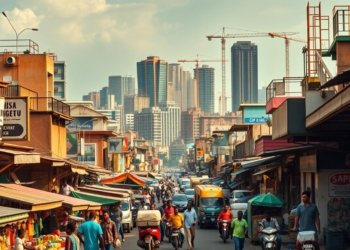What if the next big market opportunity isn’t in Silicon Valley or Europe—but in Africa? With a population growing three times faster than the global average, the continent offers unmatched potential for entrepreneurs. By 2030, Africa will be home to 1.7 billion people, creating massive demand in sectors like energy, healthcare, and tech.
Urbanization is reshaping the landscape, with cities expected to surpass rural populations by 2033. This shift fuels needs for sustainable solutions, like Ethiopia’s Reppie Waste-to-Energy Plant, which converts 1,400 tons of daily waste into electricity. The UNEP estimates waste recycling alone could unlock $8 billion annually.
Africa’s GDP growth outpaces global averages, with 18 economies projected to exceed 5% growth. The rising middle class and digital adoption—like East Africa’s mobile banking boom—make it a prime destination for innovation. But success requires understanding local markets and collaborating with regional partners.
Key Takeaways
- Africa’s population surge drives demand across 30+ industries.
- Urbanization creates opportunities in energy, healthcare, and tech.
- Waste recycling holds an $8B/year economic potential.
- GDP growth outperforms global averages, with 18 countries exceeding 5%.
- Local partnerships and tailored solutions are critical for success.
Why Africa is the Next Frontier for Entrepreneurs
Africa’s economic landscape is transforming faster than most realize. With a median age of 19, the continent’s youthful energy fuels innovation and demand. Urban hubs like Lagos and Nairobi grow by 4% annually, outpacing global averages.
Demographic and Economic Megatrends
By 2040, Africa’s workforce will surpass China and India. This demographic dividend powers industries from tech to agriculture. GDP growth rates exceed 5% in 18 nations, driven by mobile banking and regional trade pacts.
Yet gaps remain. Only 5% of sub-Saharan households use LPG, and 40% lack electricity. These challenges create openings for scalable solutions. Nigeria’s $10B LPG market and Egypt’s CNG transport adoption prove the potential.
Untapped Opportunities Across Industries
Healthcare is ripe for disruption. Ghana’s LuccaHealth Center achieves 30% margins with same-day surgeries. Specialist clinics could tap into medical tourism’s $3B+ sector.
Tech leapfrogging is another frontier. Africa has 650M+ mobile users but just 24% internet penetration. Startups like Kenya’s M-Pesa show how mobile-first solutions thrive.
Renewable energy lags too. Sub-Saharan Africa has 1 waste-to-energy plant versus France’s 126. Infrastructure gaps in recycling and solar could unlock $8B annually.
How to Start a Business in Africa: Key Steps
Over 400 African enterprises now generate $1B+ yearly, proving the continent’s viability for scalable ventures. eCommerce grows at 25% annually, but growth hinges on tailored strategies. Follow this 10-step framework to navigate Africa’s unique landscape.
1. Identify Local Gaps: Nigeria’s healthtech startups shifted to point-of-care data collection after observing hospital workflows. Adapt your business model to unmet needs.
2. Craft a Localized Plan: EcoRecycle’s $10.5M waste management plan succeeded by aligning with municipal recycling habits. Avoid templated approaches.
3. Secure Strategic Partnerships: Transfy’s multicurrency API gained traction by collaborating with regional banks. Local allies reduce investment risks.
4. Leverage Mobile-First Solutions: With 120M+ mobile money users, Africa’s market favors platforms like M-Pesa. Prioritize accessibility.
5. Test and Pivot Quickly: Startups that iterate based on feedback, like Kenya’s SunKing Energy, outpace competitors. Agility drives growth.
Africa’s business ecosystem rewards those who blend global expertise with hyperlocal execution. From funding to scaling, every step must reflect regional realities.
Identifying High-Growth Business Opportunities
High-growth industries in Africa are solving critical challenges while delivering profits. Entrepreneurs who align with urgent local needs—like clean energy and healthcare—gain a competitive edge. Three sectors stand out for their scalability and demand.
Waste-to-Energy and Recycling Ventures
Africa’s waste crisis fuels innovation. Ethiopia’s Reppie plant converts 1,400 tons of daily waste into electricity, powering 30% of Addis Ababa. Similar projects, like Koshe’s 40-megawatt facility, highlight the production potential.
Recycling infrastructure remains underdeveloped. The UNEP estimates an $8B annual opportunity in waste management. Startups leveraging mobile tech for collection or upcycling could dominate this space.
Specialist Healthcare for Medical Tourism
Africa’s $11B medical tourism market grows as patients seek affordable care. Nigeria alone sends thousands abroad yearly. Clinics like Ghana’s LuccaHealth prove local solutions can capture this demand with 30% margins.
Specialized centers for surgeries or diagnostics could reduce outbound medical travel. Partnerships with insurers and governments would boost accessibility.
LPG and Alternative Energy Solutions
Only 5% of African households use LPG, causing 1.6M annual deaths from indoor pollution. Nigeria’s Gas2You built a $10M distribution network, proving scalable solutions work.
Existing infrastructure, like Algeria-Italy gas pipelines, supports regional expansion. CNG adoption in Nigeria’s 3,000 buses shows long-term cost benefits over charcoal.
Conducting Market Research for African Markets
Four out of five ventures collapse within five years—often due to overlooked market insights. Africa’s diverse consumers demand hyperlocal strategies. A structured 4-phase research process mitigates risks.
Phase 1: Desk Research
Leverage secondary data from Jumia reports or UNECA statistics. Identify trends like mobile money adoption, which grew 15% in East Africa last year.
Phase 2: Field Research
Ethnographic methods reveal nuances. A Nigerian healthtech startup spent 1,000+ hours observing hospitals before designing patient-tracking tools.
Phase 3: Competitor Analysis
Map local players and gaps. Kenya’s SunKing Energy outperformed rivals by focusing on pay-as-you-go solar systems for rural households.
Phase 4: Validation
Pilot programs test assumptions. EcoRecycle scaled after proving waste collection routes matched Lagos’s informal recycling networks.
Overcoming data gaps is critical. Trade associations provide sector-specific insights, while Afrobarometer surveys clarify consumer priorities. GSMA’s mobile trends reports supplement fragmented national data.
Africa’s market potential is vast, but only rigorous research turns opportunities into sustainable ventures.
Navigating Legal and Regulatory Requirements
Nearly half of all startups face legal obstacles when expanding across African markets. Fintech and logistics ventures encounter the toughest hurdles, but proactive planning simplifies compliance. Tailor your approach to each country’s evolving frameworks.
Business Registration and Licensing
Registration timelines range from 48 hours in Rwanda to 30 days in Nigeria. Nigeria’s CAC portal streamlines incorporation, while Kenya’s eCitizen platform centralizes permits. Solutions like Ghana’s paperless system cut costs by 60%.
Solar startups often navigate mini-grid licensing. A Nigerian firm reduced approval delays by pre-submitting environmental impact assessments. Partnering with local attorneys avoids costly revisions.
Industry-Specific Compliance
Healthtech ventures must meet WHO prequalification for medical devices. Kenya and South Africa enforce Extended Producer Responsibility (EPR) laws for e-waste. Non-compliance risks fines up to 5% of revenue.
Renewable energy sector rules differ by country. Nigeria mandates hybrid mini-grid permits, while Ethiopia requires federal-level approvals. Track renewal deadlines with a compliance calendar.
- Medical imports: WHO prequalification + local FDA clearance.
- E-waste: Kenya’s EPR fees start at $3,000/year.
- Energy: Nigeria’s mini-grid permits take 90 days.
Choosing the Right Business Structure
75% of Nigerian companies operate as LLCs, while Ethiopia’s market thrives with cooperatives—selecting the right model shapes your venture’s future. Each structure impacts liability, taxes, and scalability.
Sole proprietorships suit small-scale operations but expose owners to unlimited liability. Joint ventures (JVs) spread risk, ideal for cross-border investment. Public Limited companies attract capital but face stricter regulations.
Tax rules vary regionally. East Africa’s VAT thresholds start at $50,000 annual turnover, while West Africa averages $100,000. Nigeria’s CIT rate is 30%, but Rwanda offers 0% for startups in priority sectors.
Ghana’s diaspora-friendly policies allow 40% foreign equity in most sectors. South Africa requires 30% local ownership for certain industries. Align your business model with these rules to avoid penalties.
Incorporation costs range from $200 in Kenya to $1,000+ in Angola. Nigeria’s CAC fees are $300 for LLCs, while Ethiopia charges $150 for cooperatives. Factor these into your growth strategy.
Securing Funding for Your African Startup
African startups attracted $5.4B in 2022, signaling a booming ecosystem for innovation. Capital flows now span remittances, venture capital, and grants—each with unique advantages for growth.
Diaspora Investment Funds and Remittances
Diaspora investors contribute over $95B yearly to Africa. Platforms like Afriex enable direct investment in local ventures, bypassing traditional banks. Nigeria’s Flutterwave leveraged diaspora networks during its $250M Series D round.
Grants and Venture Capital Options
Non-dilutive grants suit early-stage startups. AfDB’s AgriPitch awards $120K to agritech ventures, while Google’s Black Founders Fund offers $100K plus mentorship. For equity funding, top VCs include:
- Partech Africa: Backs fintech and logistics.
- TLcom: Focuses on scalable tech solutions.
- Novastar: Prioritizes impact-driven enterprises.
Series A rounds average 25% equity dilution. Flutterwave’s valuation soared by 10x post-Series D, proving Africa’s potential for high-return investment.
Building Local Partnerships and Networks
Local partnerships drive 68% of successful market entries in Africa, according to McKinsey. Collaborating with trusted local partners reduces risks and accelerates growth. From due diligence to distributor agreements, here’s how to build winning alliances.
Due Diligence Checklist
Verify potential partners’ financial health, compliance history, and market reputation. Safaricom’s joint venture with Vodafone succeeded by aligning governance structures and shared KPIs. Always assess cultural fit—misaligned values derail 30% of collaborations.
Leverage Chambers of Commerce
Nigeria’s NACCIMA and Kenya’s KEPSA connect businesses with vetted local partners. These networks provide regulatory insights and introductions to distributors. Coca-Cola’s Ethiopia expansion relied on KEPSA’s logistics recommendations.
FMCG Distributor Margins
Typical margins range from 15% (Nigeria) to 25% (South Africa). P&G’s $300M joint venture with SDP optimized margins by co-investing in warehousing. Local knowledge cut distribution costs by 18%.
Case Study: P&G’s Nigeria Model
P&G partnered with SDP to navigate customs delays and retail networks. Their hybrid distribution solutions boosted market share by 22% in two years. The lesson? Local expertise trumps global scale alone.
Leveraging Technology for Business Growth
Digital transformation is reshaping Africa’s business landscape at an unprecedented pace. From fintech to agriculture, technology bridges gaps and unlocks efficiency. Transfy’s multicurrency API, for example, slashes cross-border payment fees by 60%.
Choosing the right tech stack is critical. USSD interfaces reach offline users, while apps suit urban markets. Nigeria’s Hello Tractor deployed IoT solutions to optimize farming, securing $10M in funding.
AI drives smarter decisions. mPharma uses predictive data models to manage inventory across 300+ pharmacies. Their system reduces stockouts by 40%, proving AI’s scalability.
Cloud computing cuts costs for startups. On-premise systems demand upfront investment, but cloud platforms like AWS scale with growth. For SMEs, cloud solutions reduce IT expenses by 30%.
Africa’s digital leapfrogging creates unique advantages. Mobile money platforms like M-Pesa simplify eCommerce transactions. These innovations prove that local technology adapts to real-world needs.
Setting Up Efficient Operations
Efficient operations separate thriving ventures from struggling ones in Africa’s competitive markets. Infrastructure gaps cost businesses 30% in lost productivity, but smart strategies turn these challenges into advantages.

Optimize Last-Mile Logistics
Nigeria’s MAX.ng cut delivery times by 40% using motorcycle networks. Their model adapts to congested cities, where traditional trucks fail. Key metrics like drop-off rates improved by 25% with real-time tracking.
Renewable Energy Backups
Kenya’s solar-powered cold storage solutions ensure farm produce stays fresh. These systems reduce spoilage by 60%, proving critical in regions with unstable grids.
Warehouse Automation
Twiga Foods’ $50M investment in automated sorting boosted production speed by 3x. Their inventory SOP template, now used by 200+ suppliers, slashed errors by 90%.
Process Mapping
Identify bottlenecks early. Ghana’s AgroCenta digitized farmer payments after mapping delays in cash-based logistics. The result? Transactions completed in hours, not days.
Africa’s infrastructure demands creativity, but the rewards justify the effort. From solar backups to smart warehouses, operational excellence fuels sustainable growth.
Marketing Strategies for African Consumers
Marketing in Africa demands a blend of cultural insight and digital innovation. With 70% of Kenyan SMEs using WhatsApp for sales, understanding local behaviors is as critical as choosing the right channels.
Localized Advertising and Language Considerations
KCB Bank’s “Lionesses of Africa” campaign thrived by weaving storytelling into local dialects. Ads in Swahili or Yoruba resonate 40% more than English-only content. Tailor messaging to regional values—family and community often outperform individualism.
Digital and Traditional Channels
Compare ROI: Lagos billboards cost $1.50 CPM, while Facebook Ads average $0.80. Yet, OOH hotspots like Lekki Highway deliver 90% visibility during rush hour. Konga’s TV infomercials achieve 12% conversions by blending urgency with local payment options.
Influencer tiers matter. Micro-influencers (10K followers) charge $50–$200 per post but drive 3x engagement versus macro-influencers. For growth, balance digital reach with radio spots in rural areas—where 60% of consumers still tune in daily.
Africa’s market rewards hybrid strategies. M-Pesa’s SMS campaigns and Jumia’s YouTube tutorials prove that mixing channels maximizes impact. Test, measure, and pivot—just like Nairobi’s top-performing brands.
Managing Cross-Border Payments and Logistics
Cross-border commerce in Africa demands seamless payment and logistics solutions. With over 40 currencies and complex regulations, ventures must optimize transactions and supply chains. Platforms like Transfy cut FX losses by 15% through real-time settlements.
High-volume corridors like Nigeria-Ghana handle $200M monthly. The Pan-African Payment and Settlement System (PAPSS) simplifies exchange by linking central banks. Flutterwave’s $32B processed transactions prove scalable infrastructure works.
Incoterms impact costs significantly. DDP (Delivered Duty Paid) shifts risk to sellers, while FOB (Free On Board) suits buyers controlling shipping. Compare rates: DDP costs 12% more but avoids customs delays.
Negotiate Letters of Credit (LCs) with Ecobank or Stanbic using this checklist:
- Verify beneficiary credibility
- Clarity on shipment deadlines
- Confirm LC irrevocability
Chipper Cash’s $2B valuation highlights mobile-first payments. Before regulatory shifts, their app processed remittances at 1/3 traditional fees. Adaptability in logistics and compliance ensures longevity.
Overcoming Common Challenges
Currency fluctuations and political shifts create unique hurdles for ventures in Africa. Nigeria’s exchange rate swung from 450 to 950 Naira per dollar in 2023, squeezing profit margins. Construction firms face 60-day payment delays, stressing cash flow. Yet, adaptable solutions turn these challenges into advantages.
Crisis Scenarios
Economic instability tops the list of problems. Currency devaluation erodes revenues, while coups disrupt supply chains. Diversifying revenue streams, like Kenya’s Twiga Foods, hedges against volatility. Real-time data tools monitor political risks, enabling swift pivots.
Supply Chain Workarounds
Dangote Cement’s vertical integration cuts reliance on imports. Owning mines, trucks, and ports solves infrastructure gaps. Smaller firms partner with logistics platforms like Lori Systems to bypass port delays.
Political Risk Insurance
Lloyd’s of London covers losses from regulatory shifts or unrest. Policies typically cost 1–5% of insured value. Ghana’s oil sector uses this to safeguard $2B+ investments.
Case Study: Andela’s Pivot
The startup shifted from developer training to a talent marketplace amid funding droughts. Their agile response to market challenges secured $200M in new revenue. Flexibility is Africa’s ultimate solution.
Scaling Your Business Across African Markets
Scaling across Africa requires strategic planning beyond borders—MTN’s $15B revenue proves it’s possible. The telecom giant operates in 16 countries, leveraging localized solutions like Nigeria’s $400M broadband investment. Your expansion needs similar precision.
Hub-and-Spoke Model
Kenya’s EAC gateway status makes it ideal for regional growth. Centralize operations in Nairobi while serving Tanzania, Uganda, and Rwanda. Logistics costs drop 20% with shared warehousing.
Franchise vs. Subsidiary
Franchises suit fast-food markets with lower upfront costs. Subsidiaries offer control—Heineken’s 8-country brewery footprint shows the trade-off. Local partners handle compliance, but retain IP ownership.
Regional HQ Setup
Rwanda’s 5-day incorporation attracts pan-African HQs. Workforce Africa’s EOR services streamline payroll and compliance. Their risk management minimizes legal exposure during expansion.
Heineken’s Blueprint
The brewer scaled by acquiring local brands like Nigeria’s Champion Lager. Adapt recipes to regional tastes while centralizing growth strategies. Their model balances global scale with local relevance.
Success Stories and Lessons Learned
Visionary companies across Africa prove that innovation thrives in challenging markets. Flutterwave’s $3B valuation in five years shows the potential of fintech solutions tailored to local needs. Their API-first approach simplified cross-border payments, attracting major investors like Tiger Global.

M-Kopa’s $245M solar financing model demonstrates scalable impact. By combining mobile payments with IoT technology, they’ve powered 1 million homes. Their pay-as-you-go system achieved 95% repayment rates—a case study in sustainable growth.
Not all ventures succeed. Kalahari.com, once Africa’s “Amazon,” collapsed after expanding too quickly. The lesson? Localized logistics matter more than global benchmarks. Meanwhile, Shoprite’s Nigeria exit contrasted sharply with Carrefour’s expansion—proof that cultural adaptation determines retail success.
Founder insights reveal critical patterns. Iyinoluwa Aboyeji’s journey from failed startups to Andela and Flutterwave underscores resilience. Tunde Kehinde pivoted from Jumia to ACE by spotting gaps in last-mile delivery. Their experiences shape our 10-question template for aspiring entrepreneurs:
- What unmet need does your solution address?
- How does your model adapt to local infrastructure?
- Which partnerships will accelerate your traction?
- What metrics prove product-market fit?
- How will you navigate regulatory hurdles?
- What’s your contingency plan for currency risks?
- Which cultural nuances impact your operations?
- How do you balance scale with profitability?
- What failure scenarios have you stress-tested?
- Which mentors challenge your assumptions?
These case studies and tools illuminate the path for tomorrow’s market leaders. Africa rewards those who blend global vision with grassroots execution—a formula for enduring success.
Conclusion
Africa’s opportunities shine brighter than ever. Urbanization, a tech-savvy youth population, and leapfrog innovations create fertile ground for scalable ventures. The continent offers $100M+ sectors—from renewable energy to healthcare—ready for bold entrepreneurs.
Success hinges on local insights. Tailored business models outperform generic ones. Download our actionable templates to jumpstart your growth strategy. Stay ahead with monthly updates on Africa’s evolving market trends.
Now is the time to act. The right blend of vision and hyperlocal execution unlocks unmatched potential. Will you seize it?
FAQ
What makes Africa a promising market for entrepreneurs?
Rapid population growth, urbanization, and rising consumer demand create untapped opportunities. Sectors like renewable energy, healthcare, and fintech show strong potential.
Which industries offer the best growth potential?
Waste-to-energy, medical tourism, and alternative energy solutions are thriving. Agribusiness, e-commerce, and logistics also present high-value prospects.
How do I register a company in African countries?
Requirements vary by country. Nigeria, Kenya, and South Africa have online portals for business registration. Local legal advisors help navigate industry-specific rules.
What funding options exist for startups?
Venture capital firms like Partech Africa and grants from organizations such as AfDB support early-stage ventures. Diaspora investment networks also provide capital.
How important are local partnerships?
Critical. Partnering with distributors, suppliers, or community leaders accelerates market entry. Networks reduce risks and improve operational efficiency.
Can digital tools help scale operations?
Yes. Mobile payment systems like M-Pesa and cloud platforms streamline transactions. E-commerce solutions expand reach across borders.
What are common logistical challenges?
Infrastructure gaps may affect supply chains. Working with regional logistics firms like DHL or local transporters ensures smoother deliveries.
How do I market effectively to African consumers?
Blend digital campaigns with radio and influencer outreach. Local language ads and culturally relevant messaging drive engagement.
Which countries are easiest for business expansion?
Rwanda, Ghana, and Mauritius rank high for ease of doing business. Nigeria and Kenya lead in market size and startup activity.
What legal risks should I prepare for?
Tax compliance, labor laws, and sector-specific regulations vary widely. Consult firms like Deloitte Africa for tailored guidance.








